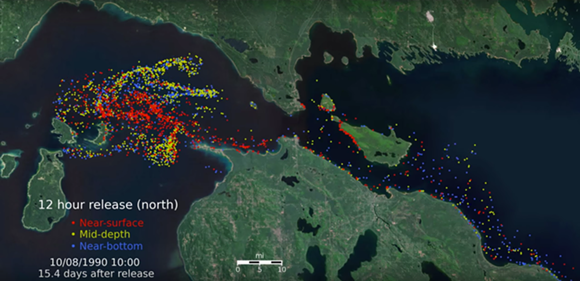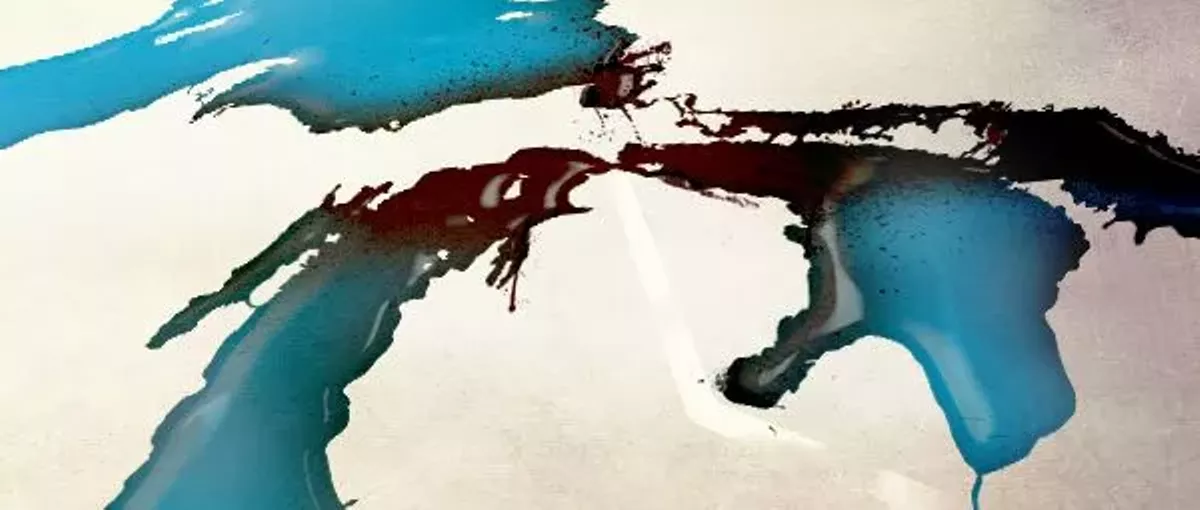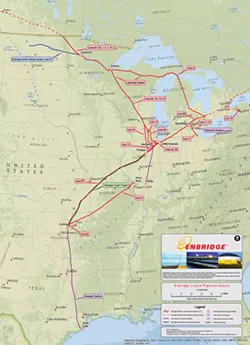
Of course, other organizations have tried to file a FOIA for Line 5's safety data — and all have come up short. The NWF tried to obtain documents through the U.S. Department of Transportation's Pipeline and Hazardous Materials Safety Administration, or PHMSA. On Oct. 22, 2013, the organization sent a request for all inspection reports for Line 5, underwater photos, and oil spill response plans.
PHMSA didn't respond with documents until nearly half a year later. In March 10, 2014, and April 17, 2014, they sent the NWF CDs containing Enbridge's oil spill response plans, though they were redacted "to protect law enforcement information that could reasonably be expected to endanger the life or physical safety of any individual," which FOIA exempts.
In May 2014, PHMSA attorney Amelia Samaras followed up on the inspection reports. "All of these requirements require the vast creation and maintenance of records, which operators, not PHMSA, maintain," the email read. "However, we routinely engage in enforcement actions for failure to prepare and maintain records." A June 19, 2014, response warned that some documents may be unavailable to protect "trade secrets and commercial or financial information obtained from a person [that is] privileged or confidential" from disclosure.
As of this year, PHMSA is still working on the NWF's initial Oct. 22, 2013, FOIA request. "You also inquired on whether 'unusual circumstances' applies to your FOIA request," a letter dated Feb. 12 reads. "At this time we would like to notify you that unusual circumstances applies to your request because of the need to search for and collect the requested records from an establishment separate from the office processing your request, which is our FOIA office in [EPA] Headquarters."
Mark Brush is another reporter who tried to obtain data on Line 5's safety using FOIA. Brush is a producer for Michigan Radio's WUOM in Ann Arbor, which has a segment called "MI Curious" in which listeners submit questions for the producers to investigate. Brush says following the NWF report, listeners wanted to know more about the safety of Line 5. So Brush tried to find out.
"I investigated that — trying to get to the bottom of it and what's the basic condition of it," Brush says. "Not whether it should be moved or what would happen if a spill happened. It was just essentially 'what's the condition of the pipeline' — and I couldn't get this question answered."
Brush says the company wouldn't go any further when he asked them to show him the data. "They were willing to meet with me and show me stuff, and take me out to the straits, but I hit a wall when I asked them to show me the data," he says. "That's when everything stopped."
Brush's most recent report, released in September, indicates "we're still waiting for confirmation of the health of Line 5." (The article ends with a disclaimer that Enbridge Energy is a financial supporter of Michigan Radio).
Enbridge maintains it carefully monitors the integrity of the pipelines using "inline inspection tools," or advanced sensors that travel inside the pipelines, scanning the thickness of the pipe walls. But the inline inspection tools' data can't be obtained via the Freedom of Information Act because they don't exist in a hard copy. Brush says regulators' only option is to log into a web portal and review the raw data. (As defined in the Freedom of Information Act, "public record" does not include computer software.)
"PHMSA doesn't physically have any of the copies of what these what these inline inspection tools show," Brush says. "So if you try to FOIA them, they're just like we don't have them — and they're right."
And if some politicians have their way, it could get even harder to obtain such data. Earlier this year, state Rep. Kurt Heise (R-Plymouth Twp.) introduced House Bill 4540, which would amend the Freedom of Information Act to exempt energy companies if such information "could be useful to a person in planning an attack on critical energy infrastructure." In other words: Oil companies should be allowed to operate in secrecy to protect stateside oil pipelines from terrorist attacks.
A spokeswoman for Heise said he would not be available to comment on the bill.
'The fox watching the henhouse'
In the wake of the NWF report, the state assembled the Michigan Petroleum Pipeline Task Force, co-chaired by Michigan Attorney General Bill Schuette and MDEQ director Dan Wyant (whose resume includes another water-related SNAFU, regarding the recent lead poisoning of the drinking water of thousands of Flint residents.)
Following a year of analysis and information-gathering, the task force released a report in July. The report criticized Enbridge on multiple fronts, pointing out that Line 5's safety data has not been made public. And the report confirmed the results of NWF's dive — Enbridge had seemingly failed to comply with the original 1953 Easement, which said no span should exceed 75 feet. According to the report, as of July 2014 there were still some unsupported spans exceeding the 75-foot limits, though it indicates that Enbridge says it has since rectified the problem.
The report also questioned Enbridge's judgment in determining the costs to clean up a spill in the straits. In correspondence with the state, Enbridge initially estimated total cleanup and oversight costs for a "worst-case" spill would range from approximately "$445 million (summer spill scenario) to approximately $900 million (winter spill scenario)." But according to the report, Enbridge later backtracked, asserting that total costs would only come to $400 million. The flip-flopping didn't help Enbridge's trustworthiness. "Enbridge's estimates cannot be considered completely objective as it has an inherent economic incentive to under-estimate the magnitude of a spill and the resulting liability," the report says.
The report maintains the state has the authority to ultimately shut down Line 5 using a court order if it could prove "that there were clear violations of the 1953 Easement or state law, that there was an imminent threat that the straits pipelines would fail, and that such a threat outweighed any interest in Enbridge continuing to operate the pipeline."
Yet even though Enbridge was found to be in violation of the 75-foot spans, the report falls short of calling on Enbridge to halt the flow of oil through the straits, indicating "at this juncture, particularly given the nearly unanimous view that there is inadequate information at this time to fully evaluate the risks presented by the straits pipelines, the task force does not find a basis for recommending that the state take the extraordinary action of seeking a court order to immediately shut down the straits pipelines."
David Holtz says the task force is a start, but it's not enough. Holtz is the Sierra Club's Michigan chair, and leads Oil and Water Don't Mix, a campaign to shut down the Straits pipeline.
He says ultimately the task force has been disappointing. "Instead of treating it with the kind of urgency that we think it deserves, they pretty much engaged in what amounts to process," he says. "Well, you know, you don't need a process. You need leadership. And what we've not gotten from the governor or the attorney general is leadership in addressing this urgent problem. We've just gotten process."
One example of this process: One of the task force's report's recommendations was for the state to appoint a pipeline safety advisory board. The group held its first public meeting Oct. 28. Holtz attended the meeting, and voiced his own concerns with the advisory board. "This is not a group of people who you will expect will do anything that isn't through the lens of what Enbridge's interests are," he says, pointing out that board members include Enbridge's Brad Shamla, vice president of U.S. operations, and Craig Pierson, president of Marathon Pipe Line LLC. "I think the whole thing is really just an attempt to put a buffer between the politicians and having to make a decision that would go against the oil industry," he says.
Holtz thinks it would be better if the state commissioned an independent study to look at alternatives. Instead, they've created a board whose members have too much at stake. "It's the fox watching the henhouse," he says. "It doesn't give you a lot of confidence in what the result is going to be."
Addicted to oil
In recent years, Enbridge has gotten pretty used to addressing public concerns over Line 5. Its website has a dedicated page for the pipeline with an easy-to-access URL: enbridge.com/line5. The page features colorful infographics touting the benefits of Line 5, emphasizing that the pipeline has been incident-free for more than 60 years. In September, Enbridge — in conjunction with the U.S. Coast Guard and local law enforcement — staged a mock spill exercise in the straits. In a video about Line 5 for Vice's Motherboard channel, documentarian Spencer Chumbley characterized the drill as "a very interesting kind of dog and pony show" for the public. The results from the drill have not yet been made public.
When asked about the safety of Line 5 by phone, Enbridge spokesman Jason Manshum launches into a well-rehearsed oral presentation on the pipeline at large — the kind of spiel you could easily imagine accompanying a PowerPoint presentation at a shareholders meeting. "It's a balance, I believe, we can strike between the energy that we all need and use on a daily basis and the environment," he says, prefacing the routine. "Keep that in mind as we talk."
Manshum explains that Line 5 carries two distinct products: light crude oil and natural gas liquids. The light crude makes up 80 percent of the contents of Line 5, while the NGLs make up 20 percent. In the Upper Peninsula, Line 5's NGLs are dropped off to get refined. The end product is propane, which is used to heat 85 percent of homes throughout the U.P. and northern Lower Peninsula. The straits pipelines do not carry the heavy crude oil that spilled in the Kalamazoo River.
About 30 percent of all the crude that's transported in the line gets off at Marysville, Mich., near Port Huron. Then it continues south to refineries in Detroit and Toledo. Here, Manshum would like to divert your attention to the endgame instead of the process. "Beyond that, it's asphalt for roads, feedstock for farmers, the case of an iPhone or Android, eyeglass frames, plastic water bottles, crayons, Vaseline," Manshum says. "All of those products come from petroleum that we transport to and through the state."
Manshum points out that Line 5's economic impact goes beyond what's refined from its products. We drifted away from the question of safety a long time ago. "It's really a multiplier effect of what happens," he says. "If you think of all the purchases we make in the community, all the goods and services, all the jobs that come from the crude oil — the refinery jobs, the oil industry jobs — that really is a huge component." He says Enbridge pays nearly $22 million in the state in property taxes, and employs roughly 250 people who live and work in Michigan.
Manshum, who answers questions with the look-over-there ease of a politician and speaks in monologues, says the dynamics of energy production in the U.S. have changed dramatically in the past decade — the U.S. is now the world's largest oil and gas producer. "North America could soon become energy self-sufficient — meaning we're not getting it from sources like, say, the Middle East or South America," he says.
Yet, as North America produces and transports more oil, public concern about fossil fuels is growing — due, in part, to high-profile spills, like Line 6B. "In Marshall, that was an extremely difficult time for the community. It also shook our company," Manshum says. "Before that incident, most people would have said Enbridge is one of the best, if not the best, oil pipeline companies in the world. But Marshall made us take a long, hard look in the mirror. And we realized we might have been good, but we weren't good enough."
Manshum says that when it comes to inspecting the safety, Enbridge doesn't just meet safety requirements, but exceeds them. The straits pipelines, he says, can safely operate at 1,700 PSI of operating pressure, but Enbridge only operates them between 0 and 300 PSI. And since the Line 6B incident, Manshum says Enbridge has implemented the largest and most comprehensive maintenance and inspection program of any pipeline system in the world.
"It's interesting. In all the years I've traveled back and forth between the peninsulas, there's never been a time of the year when I haven't seen a maintenance crew somewhere on the Mackinac Bridge," he says. "Even in the dead of winter, they're out there. I don't know about you, but I've always taken a sense of comfort in that, knowing that I can tangibly see people maintaining this bridge. We're doing the same thing, about a mile and a half to the west. It's just that you may not always see it on the surface of the water because the line is literally at the bottom of the straits."
Manshum has another analogy. "Think of an automobile," he says. "If you've ever seen a car with 100,000 miles, it could be in good shape and still be reliable from an engine standpoint. But to have gotten that far, you've had to do regular and routine maintenance. You can't just drive it 100,000 miles without touching it, because it won't last. In a car you're doing things like changing the oil and other fluids, changing brake pads. That's what also happens in the pipe. We're inspecting and maintaining and replacing valves and pump station equipment."
Regarding the task force, Manshum says Enbridge gave the state everything it requested, but admits Line 5's voluminous raw safety data needs to be interpreted by a third party. He says they're doing so now. "It's under development. The important thing is we do it in such a way that it works rather than trying to rush something and get it out the door," he says. "We're anxious to get it out, but we want to make sure we do it in a solid way. I don't have an actual date."
As far as the endgame for Line 5, Manshum says there are no plans to decommission it any time soon. "Rerouting Line 5 would be massively disruptive in many communities," he says. "Without Line 5, how would we satisfy our energy needs? That would mean either trucks on the road or railway cars. What we don't want is to go back to moving it on water by boat. The simple fact is pipelines are the safest, most effective way to move energy. So unless we get off of energy altogether and never move any product, we have to have pipelines."
Kicking the can
Environmentalists continue to pressure Enbridge and the state to reconsider Line 5, but some are resigned to the fact that Michigan's far-right-wing administration probably won't take any action on Line 5 any time soon.
"I think the only thing that is probably important for people to understand is that if the state continues on the path or the direction they're taking on this issue, it's going to be the next attorney general and next governor that will have to solve the problem. It's not going to be the current attorney general or current governor," says the Sierra Club's Holtz. "I think that they had the information they need, they had the opportunity to act, and everything that we've seen so far suggests that we can't expect them to take the kind of action that we need to begin the process of decommissioning Line 5."
And Holtz doesn't see any reason to believe Enbridge will make the call either. "Enbridge's basic position about their 62-year-old pipeline through the Straits of Mackinac is that it's safe because it hasn't ruptured yet. In other words, for 62 years it hasn't ruptured," he says. "But the problem with the logic behind that is, you could say that about every one of 116 pipeline incidents that happened between 2004 and 2013 — that up until they ruptured they were safe. You could say that, except it wouldn't be true."
The original 1953 Easement — the one that Enbridge was found to be violating as recently as 2014 by exceeding the mandated 75-foot span limits — also requires that "at all times [Enbridge] shall exercise the due care of a reasonably prudent person for the safety and welfare of all persons and of all public and private property."
Whether Enbridge can be described as "reasonably prudent" is, for critics, up for debate.
What can't be denied is that the only way to really guarantee there is never an oil spill in the Straits of Mackniac is if no oil flows through them.
The Pipeline Safety Advisory Board's next public meeting is 1:30 p.m. to 3:30 p.m. Monday, Dec. 14 at Constitution Hall, 525 W. Allegan St., Lansing; more information is available at 800-662-9278 and michigan.gov.









